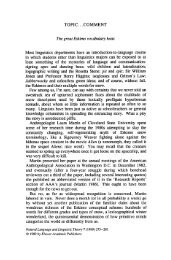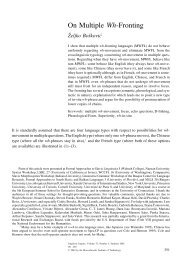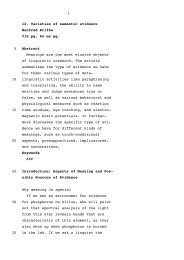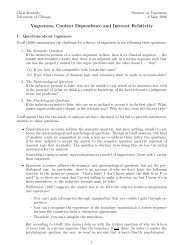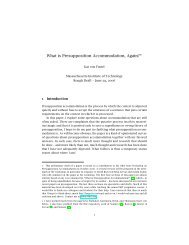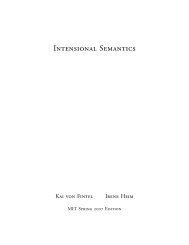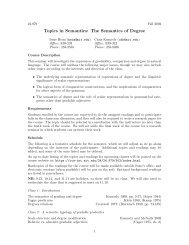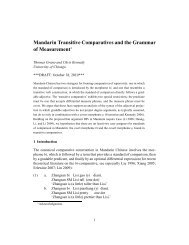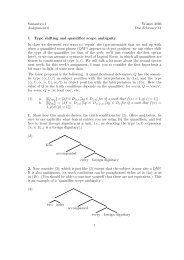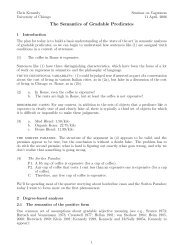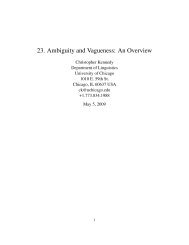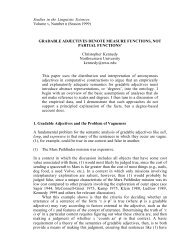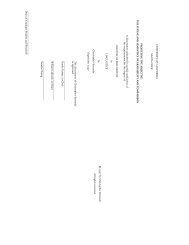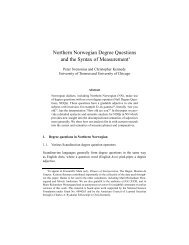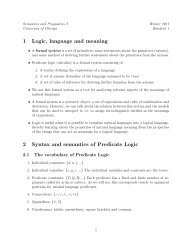On the natural history of negative polarity items - Syntax, Semantics ...
On the natural history of negative polarity items - Syntax, Semantics ...
On the natural history of negative polarity items - Syntax, Semantics ...
You also want an ePaper? Increase the reach of your titles
YUMPU automatically turns print PDFs into web optimized ePapers that Google loves.
Hedde Zeijlstra<br />
indefinite scopes over negation (by LF-raising [! NP] over <strong>the</strong> negation). Also (1a) can be<br />
uttered with focus on eine. Crucially, <strong>the</strong>se readings can never be yielded by (3).<br />
(5) a. Fritz kann nicht eine Fremdsprache die man in Frankreich spricht<br />
b. Fritz kann nicht EINE Fremdsprache.<br />
Second, since <strong>the</strong> effect that by uttering (1a) <strong>the</strong> speaker does not want to convey <strong>the</strong> meaning<br />
<strong>of</strong> (3) is a conversational implicature (cf. Horn 1984, 1989), this implicature should be<br />
cancellable. This is indeed correct as well, as shown in <strong>the</strong> following question-answer pair:<br />
(6) Q. Kann Fritz nicht eine Fremdsprache?<br />
A. Nein, Fritz kann nicht eine Fremdsprache. Er kann keine Fremdsprache<br />
Third, implicatures <strong>of</strong> this type disappear in downward entailing contexts (cf. Levinson 2000<br />
amongst many o<strong>the</strong>rs for discussion). Therefore, it is predicted that light negation<br />
constructions are fine when <strong>the</strong>y are embedded under a downward entailing operator, deriving<br />
<strong>the</strong>ir NPI-like distributional behaviour. Again, this is indeed correct, as shown in (1c) and in<br />
(7), taken from Schwarz & Bhatt 2008.<br />
(7) Wir haben keinen angenommen, der nicht eine Fremdsprache kennt<br />
We have no one hired, who not a foreign language knows<br />
Fourth, <strong>the</strong> implicature can only arise when nicht eine and keine stand in competition.<br />
Consequently, once lexical material intervenes nicht and eine, nicht + X + eine can no longer<br />
be replaced by keine and <strong>the</strong> construction is fine again, as shown in (8). Note that this also<br />
prevents <strong>the</strong> analysis from overgeneralizing to languages like English that lack light negation.<br />
(8) Fritz denkt nicht an eine Fremdsprache<br />
Fritz thinks not <strong>of</strong> a foreign language<br />
Fifth, <strong>the</strong> analysis <strong>natural</strong>ly extends to o<strong>the</strong>r cases <strong>of</strong> light negation. For instance, (1b),<br />
contains a definite expression under <strong>the</strong> scope <strong>of</strong> negation. Given that definite expressions<br />
presuppose <strong>the</strong> existence <strong>of</strong> <strong>the</strong>ir referent and that such presuppositions survive under<br />
negation, <strong>the</strong> sentence is truth-conditionally equivalent to a sentence where <strong>the</strong> definite<br />
expression outscopes negation, as in (9). <strong>On</strong>ce it is assumed that (8) and (9) stand in a<br />
markedness relation as well, albeit a markedness relation <strong>of</strong> a syntactic/semantic kind ((9) is<br />
an instance <strong>of</strong> plain sentential negation; (8) is a special type <strong>of</strong> constituent negation), <strong>the</strong> illformedness<br />
<strong>of</strong> (8) immediately follows.<br />
(9) Fritz hat Frage 3 nicht beantwortet.<br />
To conclude: <strong>the</strong>re is nothing special about light negation. Light negation involves regular<br />
negation and its limited distribution follows from independently established pragmatic<br />
mechanisms.<br />
References: Abels & Marti 2010. A unified approach to split scope. Natural Language<br />
<strong>Semantics</strong> 18: 435-47 " De Swart 2000. Scope ambiguities with <strong>negative</strong> quantifiers. In: K.<br />
von Heusinger and U. Egli (eds), Reference and Anaphoric Relations. Dordrecht: Kluwer "<br />
Geurts 1999. <strong>On</strong> No. Journal <strong>of</strong> semantics 13: 67-86. " Horn 198. Toward a new taxonomy<br />
for pragmatic inference: Q-based and R-based implicatures. In D. Schiffrin (ed.), Meaning,<br />
Form, and Use in Context 11-42. Washington: GUP " Horn 1989. A <strong>natural</strong> <strong>history</strong> <strong>of</strong><br />
negation. Chicago: The University <strong>of</strong> Chicago Press " Jacobs 1980. Lexical decomposition in<br />
Montague Grammar. Theoretical Linguistics 7: 121-136 " Ladusaw 1979. Expressing<br />
negation. In C. Barker and D. Dowty. SALT II. Ithaca, NY: Cornell Linguistic Circle "<br />
Levinson 2000. Presumptive Meanings, Cambridge, MA: MIT Press " Penka 2010. Negative<br />
Indefinites. Oxford: OUP. " Rullman 1995. Geen eenheid. Tabu 25: 194-197 " Schwarz 2004<br />
How to rescue <strong>negative</strong> <strong>polarity</strong> <strong>items</strong>. Ms, University <strong>of</strong> Texas at Austin. " Schwarz & Bhatt<br />
2008. Light negation and <strong>polarity</strong>. In R. Zanuttini, H. Campos, E. Herburger and P. Portner,<br />
eds., Cross-Linguistic Research in <strong>Syntax</strong> and <strong>Semantics</strong>: Negation, Tense and Clausal<br />
Architecture, 175-198, Washington: GUP. " Zeijlstra 2011. <strong>On</strong> <strong>the</strong> syntactically complex<br />
status <strong>of</strong> <strong>negative</strong> indefinites. Journal <strong>of</strong> Comparative Germanic Linguistics 14: 111-138.



